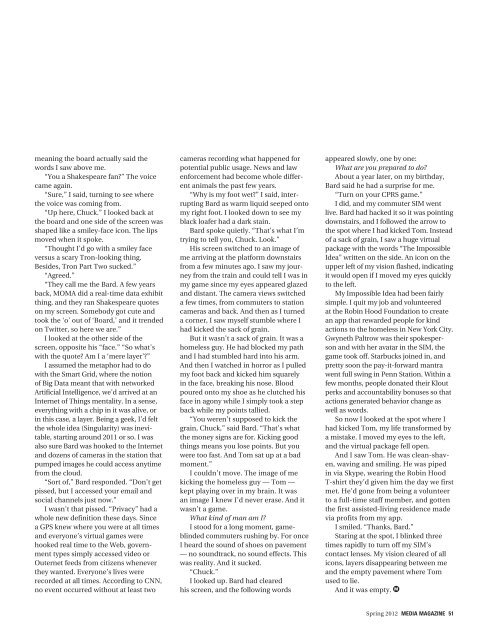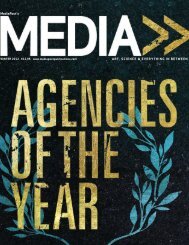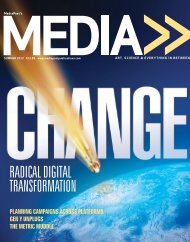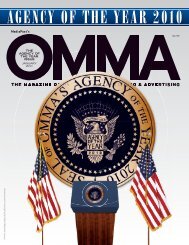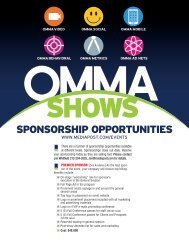THIRD ANNUAL SCREENS ISSUE - MediaPost
THIRD ANNUAL SCREENS ISSUE - MediaPost
THIRD ANNUAL SCREENS ISSUE - MediaPost
Create successful ePaper yourself
Turn your PDF publications into a flip-book with our unique Google optimized e-Paper software.
meaning the board actually said the<br />
words I saw above me.<br />
“You a Shakespeare fan?” The voice<br />
came again.<br />
“Sure,” I said, turning to see where<br />
the voice was coming from.<br />
“Up here, Chuck.” I looked back at<br />
the board and one side of the screen was<br />
shaped like a smiley-face icon. The lips<br />
moved when it spoke.<br />
“Thought I’d go with a smiley face<br />
versus a scary Tron-looking thing.<br />
Besides, Tron Part Two sucked.”<br />
“Agreed.”<br />
“They call me the Bard. A few years<br />
back, MOMA did a real-time data exhibit<br />
thing, and they ran Shakespeare quotes<br />
on my screen. Somebody got cute and<br />
took the ‘o’ out of ‘Board,’ and it trended<br />
on Twitter, so here we are.”<br />
I looked at the other side of the<br />
screen, opposite his “face.” “So what’s<br />
with the quote? Am I a ‘mere layer’?”<br />
I assumed the metaphor had to do<br />
with the Smart Grid, where the notion<br />
of Big Data meant that with networked<br />
Artificial Intelligence, we’d arrived at an<br />
Internet of Things mentality. In a sense,<br />
everything with a chip in it was alive, or<br />
in this case, a layer. Being a geek, I’d felt<br />
the whole idea (Singularity) was inevitable,<br />
starting around 2011 or so. I was<br />
also sure Bard was hooked to the Internet<br />
and dozens of cameras in the station that<br />
pumped images he could access anytime<br />
from the cloud.<br />
“Sort of,” Bard responded. “Don’t get<br />
pissed, but I accessed your email and<br />
social channels just now.”<br />
I wasn’t that pissed. “Privacy” had a<br />
whole new definition these days. Since<br />
a GPS knew where you were at all times<br />
and everyone’s virtual games were<br />
hooked real time to the Web, government<br />
types simply accessed video or<br />
Outernet feeds from citizens whenever<br />
they wanted. Everyone’s lives were<br />
recorded at all times. According to CNN,<br />
no event occurred without at least two<br />
cameras recording what happened for<br />
potential public usage. News and law<br />
enforcement had become whole different<br />
animals the past few years.<br />
“Why is my foot wet?” I said, interrupting<br />
Bard as warm liquid seeped onto<br />
my right foot. I looked down to see my<br />
black loafer had a dark stain.<br />
Bard spoke quietly. “That’s what I’m<br />
trying to tell you, Chuck. Look.”<br />
His screen switched to an image of<br />
me arriving at the platform downstairs<br />
from a few minutes ago. I saw my journey<br />
from the train and could tell I was in<br />
my game since my eyes appeared glazed<br />
and distant. The camera views switched<br />
a few times, from commuters to station<br />
cameras and back. And then as I turned<br />
a corner, I saw myself stumble where I<br />
had kicked the sack of grain.<br />
But it wasn’t a sack of grain. It was a<br />
homeless guy. He had blocked my path<br />
and I had stumbled hard into his arm.<br />
And then I watched in horror as I pulled<br />
my foot back and kicked him squarely<br />
in the face, breaking his nose. Blood<br />
poured onto my shoe as he clutched his<br />
face in agony while I simply took a step<br />
back while my points tallied.<br />
“You weren’t supposed to kick the<br />
grain, Chuck,” said Bard. “That’s what<br />
the money signs are for. Kicking good<br />
things means you lose points. But you<br />
were too fast. And Tom sat up at a bad<br />
moment.”<br />
I couldn’t move. The image of me<br />
kicking the homeless guy — Tom —<br />
kept playing over in my brain. It was<br />
an image I knew I’d never erase. And it<br />
wasn’t a game.<br />
What kind of man am I?<br />
I stood for a long moment, gameblinded<br />
commuters rushing by. For once<br />
I heard the sound of shoes on pavement<br />
— no soundtrack, no sound effects. This<br />
was reality. And it sucked.<br />
“Chuck.”<br />
I looked up. Bard had cleared<br />
his screen, and the following words<br />
appeared slowly, one by one:<br />
What are you prepared to do?<br />
About a year later, on my birthday,<br />
Bard said he had a surprise for me.<br />
“Turn on your CPRS game.”<br />
I did, and my commuter SIM went<br />
live. Bard had hacked it so it was pointing<br />
downstairs, and I followed the arrow to<br />
the spot where I had kicked Tom. Instead<br />
of a sack of grain, I saw a huge virtual<br />
package with the words “The Impossible<br />
Idea” written on the side. An icon on the<br />
upper left of my vision flashed, indicating<br />
it would open if I moved my eyes quickly<br />
to the left.<br />
My Impossible Idea had been fairly<br />
simple. I quit my job and volunteered<br />
at the Robin Hood Foundation to create<br />
an app that rewarded people for kind<br />
actions to the homeless in New York City.<br />
Gwyneth Paltrow was their spokesperson<br />
and with her avatar in the SIM, the<br />
game took off. Starbucks joined in, and<br />
pretty soon the pay-it-forward mantra<br />
went full swing in Penn Station. Within a<br />
few months, people donated their Klout<br />
perks and accountability bonuses so that<br />
actions generated behavior change as<br />
well as words.<br />
So now I looked at the spot where I<br />
had kicked Tom, my life transformed by<br />
a mistake. I moved my eyes to the left,<br />
and the virtual package fell open.<br />
And I saw Tom. He was clean-shaven,<br />
waving and smiling. He was piped<br />
in via Skype, wearing the Robin Hood<br />
T-shirt they’d given him the day we first<br />
met. He’d gone from being a volunteer<br />
to a full-time staff member, and gotten<br />
the first assisted-living residence made<br />
via profits from my app.<br />
I smiled. “Thanks, Bard.”<br />
Staring at the spot, I blinked three<br />
times rapidly to turn off my SIM’s<br />
contact lenses. My vision cleared of all<br />
icons, layers disappearing between me<br />
and the empty pavement where Tom<br />
used to lie.<br />
And it was empty.<br />
Spring 2012 MEDIA MAGAZINE 51


